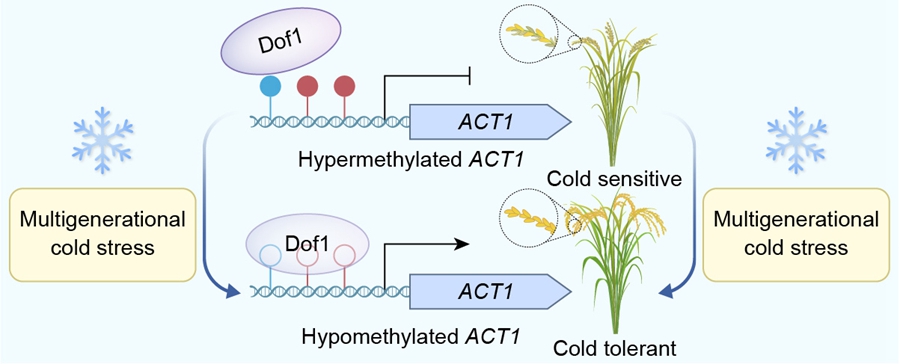Chinese researchers recently uncovered molecular evidence supporting Lamarckism—a long-debated theory from the early 19th century that acquired characteristics can be inherited.
The evidence was revealed in a new study by scientists from the Institute of Genetics and Developmental Biology of the Chinese Academy of Sciences, which deciphered the evolutionary patterns of cold adaptation during rice’s northward expansion.
Led by
Prof. CAO Xiaofeng, the researchers demonstrated that DNA methylation—a form of epigenetic variation or change in gene expression—mediates the transgenerational inheritance of acquired cold tolerance in rice, supporting Lamarck’s theory
In this study, the researchers traced the evolutionary trajectory of rice as it expanded northward into colder climates. Through an innovative multigenerational cold-stress screening system targeting the cold-sensitive meiosis stage of rice development, they applied directional selection over three generations—identifying and breeding those rice plants that best tolerated cold. This approach yielded stable rice lines with significantly enhanced cold tolerance, driven by traits showing dominant patterns of inheritance. This tolerance persisted for at least five generations, even after the stress condition was removed.
Multi-omics analyses identified hypomethylation at the ACT1 (arabinogalactan protein-coding gene) promoter as the critical epigenetic variation. The researchers used a DNA methylation editing system to precisely modify the methylation of the promoter of the arabinogalactan protein gene ACT1. In doing so, they achieved directional regulation of cold tolerance and confirmed that cold-induced hypomethylation in the promoter lifts suppression of ACT1 expression, proving the causal role of the epigenetic variation.
To uncover the molecular basis of this epigenetic regulation, the researchers next examined the underlying mechanism. They showed that cold stress downregulated the expression of DNA methyltransferase MET1b, impairing methylation maintenance at the ACT1 promoter and resulting in the formation of a hypomethylated epiallele. Further investigation found that the methylation variation region of the ACT1 promoter harbors a binding site for the transcription activator Dof1, whose occupancy is sensitive to DNA methylation status. Knockout of Dof1 significantly reduced cold tolerance at the booting stage, establishing a regulatory cascade of cold stress →MET1b downregulation →ACT1 promoter demethylation → enhanced Dof1 binding →ACT1 activation → improved cold tolerance.
Natural variation analysis demonstrated that while ACT1 coding sequences were highly conserved, its DNA methylation status exhibited polymorphism strongly associated with cold tolerance. Among 131 landraces from three major rice-growing regions in China, over 88% of varieties from the southern and central regions carried hypermethylated ACT1, whereas those from the cold northeastern region were significantly enriched for hypomethylated ACT1. This “south-high, north-low” methylation gradient suggested that ACT1 epigenetic variation was a key target of selection during rice’s domestication and geographical expansion.
By systematically elucidating the role of cold-induced epigenetic variation in rice adaptation, this study not only substantiates a molecular mechanism for rapid environmental adaptation but also provides compelling support for non-Mendelian inheritance theories long excluded from mainstream evolutionary biology. Peer reviewers hailed the work, saying, “This possibility has implication for understanding adaptive processes and hints at mechanisms that are outside the traditional Darwinian paradigm.”
Beyond theoretical implications, the study also presents a practical framework for crop improvement. The researchers propose a novel breeding strategy—“stress domestication → epigenetic variant identification → precision editing”—to develop stress-resilient crops. This approach offers a promising avenue to tackle agricultural challenges posed by global climate change.
Multigenerational cold stress induces heritable ACT1 promoter hypomethylation, enabling rice to acquire cold tolerance for high-latitude adaptation. (Image by IGDB)
Contact:
Prof. CAO Xiaofeng
Institute of Genetics and Developmental Biology, Chinese Academy of Sciences
Email: xfcao@genetics.ac.cn
 Multigenerational cold stress induces heritable ACT1 promoter hypomethylation, enabling rice to acquire cold tolerance for high-latitude adaptation. (Image by IGDB)Contact:Prof. CAO XiaofengInstitute of Genetics and Developmental Biology, Chinese Academy of SciencesEmail: xfcao@genetics.ac.cn
Multigenerational cold stress induces heritable ACT1 promoter hypomethylation, enabling rice to acquire cold tolerance for high-latitude adaptation. (Image by IGDB)Contact:Prof. CAO XiaofengInstitute of Genetics and Developmental Biology, Chinese Academy of SciencesEmail: xfcao@genetics.ac.cn CAS
CAS
 中文
中文




.png)
